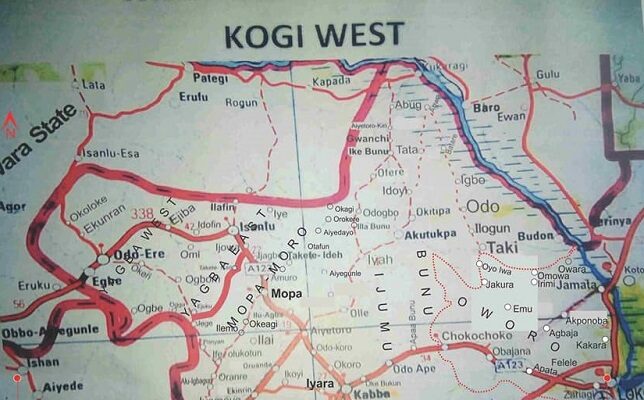Never in the history of a nation has a group of people been so recklessly abandoned and neglected by both Federal and state governments as the Okuns of Kogi state.
The Okun people are Yorubas. They descended from Ile-Ife and Oyo as their cradle in the Western Region of Nigeria. In the Nigeria’s political map, the northern regional map was drawn to include the Okuns with their headquarters in Kaduna instead of Ibadan. This error made people to often classify Okun people as Hausas who along with Fulani are the predominant group in the north. Despite the lack of free education scheme that was enjoyed by their kin and kith in the Western Region.
Okun’s zeal for Western education and their dint for hard work paid off as it propelled them to be the best educated group in any field at the time of independence. They remained the best prepared group on whose shoulders rested the operational machinery of the entire region.
They produced teachers, engineers, doctors, administrators, district officers, Permanent Secretaries. This attest to the fact that Chief S.B Awoniyi, the first Permanent Secretary, Ministry of Finance, Kwara State and first Private Secretary to the Sardauna of Sokoto, late Sir Ahmadu Bello, the Premier of Northern region and Chief S.B Daniyan, the first Private Secretary to first President of Nigeria, Dr. Nnamdi Azikiwe who (Daniyan) later became Managing Director, Nigeria Industrial Development Bank (NIDB), were both from Okun. The First Miss Nigeria, Grace Oyelude was also from Okun. Chief Olayinka Simoyan, Second Secretary at the Nigerian Embassy in Washington, DC between 1965 and 1968, later Charge d’Affaires of the Nigerian embassy in Benin Republic (1971-74) and Austria (1974-76); Chief Michael Asaju, former President, Nigeria Union of Journalists (NUJ), Barrister (Mrs) Dolapo Abanida, who was Commissioner for Justice and Attorney General, Kogi State to name but a few are among the pacesetters when Okun was once dubbed the land of the firsts.
When states were created on May 27, 1967, they found themselves in Kwara and now in present day Kogi, created on August 27, 1991.
A typical Okun is hardworking, honest, resilient and incorruptible. He or she is very individualistic and reserved. These attributes form the bedrock of cultural norm of behavior in an Okun home. They are religious, and always cooperate with the authority figure. They grew up with an axiom of good name is better than riches.
In their current state of Kogi, they earn their livelihood through education and farming. They still remain the best educated group. From a recent publication, Okun has the greatest number of professors and associate professors in the state. While these educated men and women have been rendering their services all over the globe, their home front have been neglected.
There are no Federal or State institutions or any kind of investment that would attract young people to stay and work at home. The only industry that is open to Okun is education. More than 95 percent of them rely on monthly salary for their livelihood. Salaries in Kogi are usually not paid in full but in percentages. That is between 20-40 percent of the full salary is paid to workers and the government keeps the rest showing no beholding of the amount withheld.
The Okuns are not business oriented. Many are now retired after many years of meritorious service. There is not much to show for the many years of hard work, may be a finished bungalow and the only income is a paltry sum of pension that is not paid regularly if paid at all. The lump sum of gratuity and pension are usually not paid. Rather than to continue agitation for non-payment of the salary, many have taken to subsistence farming as means of survival to augment.
Recently, the governor of Kogi State has turned Okun farmlands into Fulani open graze land. The Fulani herders have taken over the farms. They have moved to occupy Okunland thereby displacing the indigenous farmers. The situation has become so critical that it has led to the untimely deaths of so many upon retirement. Untimely deaths are now becoming a daily occurrence among the Okun people.
The current situation is not sustainable in Okunland with the herders carrying dangerous weapons such as AK-47 destroying the farmlands and virtually taken over the land by killing the farmers and whoever challenges them. Nobody goes to the farm anymore; and as such there is scarcity of food, the prices of food stuff items have become so exorbitantly high beyond the means of the people. There is no money anywhere; it has become a rare commodity since not much of business activity is going on.
If the current situation is not averted it will lead to a gradual extinction of a proud, accomplished group of people who through no fault of their own have been abandoned by regional and state governments mainly because of the geographical location of their existential home that sits on the same tectonic plate with the Yorubas of Western Nigeria but politically administered and governed from the north.
In the current dispensation nobody is looking out for the Okun people since politics in Nigeria is tribal. Neither the North nor the Western region is looking out for Okun. This makes it imperative for the Okun to look out for themselves if they are to survive. There has to be in an OKUN STATE!
The governor is not from Okun. He does not care or cater to the needs of Okuns. All anybody needs to do is to look at the state of the highway that runs across Okunland. They are all abandoned and in a serious state of neglect.
To be continued.
– Dr Tony Fagbemi wrote from USA.




